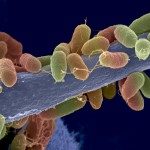Link to Pubmed [PMID] – 18606837
Antimicrob. Agents Chemother. 2008 Sep;52(9):3118-26
Aspergillus fumigatus is an opportunistic fungal pathogen responsible for invasive aspergillosis in immunocompromised individuals. The inefficiency of antifungal agents and high mortality rate resulting from invasive aspergillosis remain major clinical concerns. Recently, we reported on a new family of ultrashort cationic lipopeptides active in vitro against fungi. Mode of action studies supported a membranolytic or a detergent-like effect. Here, we screened several lipopeptides in vitro for their anti-A. fumigatus activity. To investigate the therapeutic properties of the selected peptides in vivo, we challenged immunosuppressed C57BL/6 wild-type mice intranasally with DsRed-labeled A. fumigatus conidia and subsequently treated the animals locally with the lipopeptides. Confocal microscopic analysis revealed the degradation of DsRed-labeled hyphal forms and residual conidia in the lungs of the mice. The most efficient peptide was tested further using a survival assay and was found to significantly prolong the life of the treated animals, whereas no mice survived with the current standard antifungal treatment with amphotericin B. Moreover, as opposed to the drug-treated lungs, the peptide-treated lungs did not display any toxicity of the peptide. Our results highlight the potential of this family of lipopeptides for the treatment of pulmonary invasive aspergillosis.

